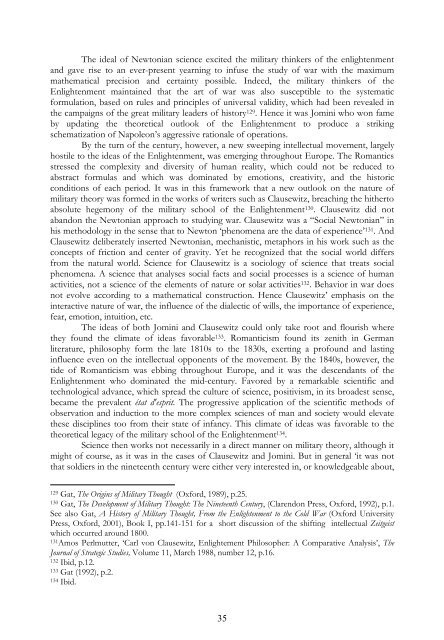Science, Strategy and War The Strategic Theory of ... - Boekje Pienter
Science, Strategy and War The Strategic Theory of ... - Boekje Pienter
Science, Strategy and War The Strategic Theory of ... - Boekje Pienter
You also want an ePaper? Increase the reach of your titles
YUMPU automatically turns print PDFs into web optimized ePapers that Google loves.
<strong>The</strong> ideal <strong>of</strong> Newtonian science excited the military thinkers <strong>of</strong> the enlightenment<strong>and</strong> gave rise to an ever-present yearning to infuse the study <strong>of</strong> war with the maximummathematical precision <strong>and</strong> certainty possible. Indeed, the military thinkers <strong>of</strong> theEnlightenment maintained that the art <strong>of</strong> war was also susceptible to the systematicformulation, based on rules <strong>and</strong> principles <strong>of</strong> universal validity, which had been revealed inthe campaigns <strong>of</strong> the great military leaders <strong>of</strong> history 129 . Hence it was Jomini who won fameby updating the theoretical outlook <strong>of</strong> the Enlightenment to produce a strikingschematization <strong>of</strong> Napoleon’s aggressive rationale <strong>of</strong> operations.By the turn <strong>of</strong> the century, however, a new sweeping intellectual movement, largelyhostile to the ideas <strong>of</strong> the Enlightenment, was emerging throughout Europe. <strong>The</strong> Romanticsstressed the complexity <strong>and</strong> diversity <strong>of</strong> human reality, which could not be reduced toabstract formulas <strong>and</strong> which was dominated by emotions, creativity, <strong>and</strong> the historicconditions <strong>of</strong> each period. It was in this framework that a new outlook on the nature <strong>of</strong>military theory was formed in the works <strong>of</strong> writers such as Clausewitz, breaching the hithertoabsolute hegemony <strong>of</strong> the military school <strong>of</strong> the Enlightenment 130 . Clausewitz did notab<strong>and</strong>on the Newtonian approach to studying war. Clausewitz was a “Social Newtonian” inhis methodology in the sense that to Newton ‘phenomena are the data <strong>of</strong> experience’ 131 . AndClausewitz deliberately inserted Newtonian, mechanistic, metaphors in his work such as theconcepts <strong>of</strong> friction <strong>and</strong> center <strong>of</strong> gravity. Yet he recognized that the social world differsfrom the natural world. <strong>Science</strong> for Clausewitz is a sociology <strong>of</strong> science that treats socialphenomena. A science that analyses social facts <strong>and</strong> social processes is a science <strong>of</strong> humanactivities, not a science <strong>of</strong> the elements <strong>of</strong> nature or solar activities 132 . Behavior in war doesnot evolve according to a mathematical construction. Hence Clausewitz’ emphasis on theinteractive nature <strong>of</strong> war, the influence <strong>of</strong> the dialectic <strong>of</strong> wills, the importance <strong>of</strong> experience,fear, emotion, intuition, etc.<strong>The</strong> ideas <strong>of</strong> both Jomini <strong>and</strong> Clausewitz could only take root <strong>and</strong> flourish wherethey found the climate <strong>of</strong> ideas favorable 133 . Romanticism found its zenith in Germanliterature, philosophy form the late 1810s to the 1830s, exerting a pr<strong>of</strong>ound <strong>and</strong> lastinginfluence even on the intellectual opponents <strong>of</strong> the movement. By the 1840s, however, thetide <strong>of</strong> Romanticism was ebbing throughout Europe, <strong>and</strong> it was the descendants <strong>of</strong> theEnlightenment who dominated the mid-century. Favored by a remarkable scientific <strong>and</strong>technological advance, which spread the culture <strong>of</strong> science, positivism, in its broadest sense,became the prevalent état d'esprit. <strong>The</strong> progressive application <strong>of</strong> the scientific methods <strong>of</strong>observation <strong>and</strong> induction to the more complex sciences <strong>of</strong> man <strong>and</strong> society would elevatethese disciplines too from their state <strong>of</strong> infancy. This climate <strong>of</strong> ideas was favorable to thetheoretical legacy <strong>of</strong> the military school <strong>of</strong> the Enlightenment 134 .<strong>Science</strong> then works not necessarily in a direct manner on military theory, although itmight <strong>of</strong> course, as it was in the cases <strong>of</strong> Clausewitz <strong>and</strong> Jomini. But in general ‘it was notthat soldiers in the nineteenth century were either very interested in, or knowledgeable about,129 Gat, <strong>The</strong> Origins <strong>of</strong> Military Thought (Oxford, 1989), p.25.130 Gat, <strong>The</strong> Development <strong>of</strong> Military Thought: <strong>The</strong> Nineteenth Century, (Clarendon Press, Oxford, 1992), p.1.See also Gat, A History <strong>of</strong> Military Thought, From the Enlightenment to the Cold <strong>War</strong> (Oxford UniversityPress, Oxford, 2001), Book I, pp.141-151 for a short discussion <strong>of</strong> the shifting intellectual Zeitgeistwhich occurred around 1800.131 Amos Perlmutter, ‘Carl von Clausewitz, Enlightement Philosopher: A Comparative Analysis’, <strong>The</strong>Journal <strong>of</strong> <strong>Strategic</strong> Studies, Volume 11, March 1988, number 12, p.16.132 Ibid, p.12.133 Gat (1992), p.2.134 Ibid.35
















